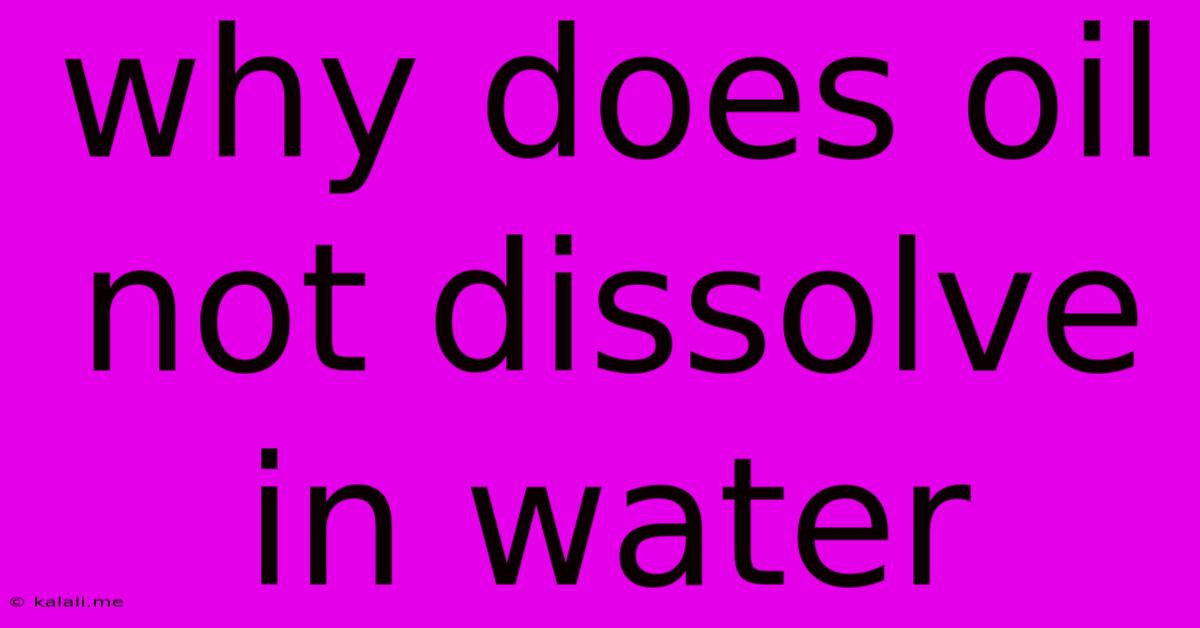Why Does Oil Not Dissolve In Water
Kalali
Jun 04, 2025 · 3 min read

Table of Contents
Why Does Oil Not Dissolve in Water? A Deep Dive into Immiscibility
Meta Description: Discover the science behind why oil and water don't mix! This article explores the concepts of polarity, hydrogen bonding, and hydrophobic interactions to explain this common phenomenon. Learn about the differences between hydrophilic and hydrophobic substances and how they impact solubility.
Oil and water. Two substances so ubiquitous in our daily lives, yet so fundamentally different in their behavior. We all know the saying: "oil and water don't mix." But why? The answer lies in the fascinating world of molecular polarity and intermolecular forces. This article will delve into the scientific reasons behind this seemingly simple observation, exploring the concepts of polarity, hydrogen bonding, and hydrophobic interactions.
Understanding Polarity: The Key to Solubility
The key to understanding why oil and water are immiscible lies in their polarity. Molecules are composed of atoms, and the distribution of electrons within these molecules determines their polarity. Water (H₂O) is a polar molecule. This means that the electrons are not evenly distributed, creating a slightly positive end (near the hydrogen atoms) and a slightly negative end (near the oxygen atom). This charge separation allows water molecules to form strong hydrogen bonds with each other.
Oils, on the other hand, are primarily composed of nonpolar molecules. These molecules have an even distribution of electrons, meaning there's no significant charge separation. Examples include long hydrocarbon chains found in vegetable oils, mineral oils, and fats. These nonpolar molecules lack the ability to form hydrogen bonds with water.
Hydrophilic vs. Hydrophobic: The Tale of Two Interactions
The behavior of molecules in water can be categorized as either hydrophilic or hydrophobic.
-
Hydrophilic (water-loving) molecules, like sugar and salt, readily dissolve in water because they can interact with the polar water molecules through hydrogen bonding or other polar interactions.
-
Hydrophobic (water-fearing) molecules, like oils and fats, are repelled by water. Their nonpolar nature prevents them from forming significant interactions with polar water molecules. Instead, they tend to clump together, minimizing their contact with water.
The Role of Hydrogen Bonding in Water's Unique Properties
The strong hydrogen bonds between water molecules are responsible for many of water's unique properties, including its high boiling point, surface tension, and ability to dissolve many polar substances. These bonds are the driving force behind the cohesion and adhesion of water molecules. Because oil molecules cannot participate in these hydrogen bonds, they are effectively excluded from the water network.
The Importance of Intermolecular Forces
The interactions between molecules, known as intermolecular forces, play a crucial role in determining solubility. In the case of oil and water, the weak van der Waals forces between oil molecules are significantly weaker than the strong hydrogen bonds between water molecules. This difference in intermolecular force strength prevents the oil molecules from integrating into the water structure.
In Conclusion: A Matter of Molecular Attraction
In essence, oil does not dissolve in water because of the fundamental difference in their molecular polarity. Water's strong polarity and hydrogen bonding create a cohesive network that excludes nonpolar oil molecules. This immiscibility is a consequence of the interplay between different types of intermolecular forces and highlights the importance of molecular structure in determining the physical and chemical properties of substances. Understanding this principle is fundamental in various fields, from chemistry and biology to environmental science and engineering.
Latest Posts
Latest Posts
-
Minecraft Teleport Player To Tamed Pet
Jun 06, 2025
-
When You Re Available Next Or Next Availble
Jun 06, 2025
-
How To Disable Ds4 In Steam
Jun 06, 2025
-
Toilet Not Flushing And Filling Up With Water
Jun 06, 2025
-
How Big Of A Tank Does A Goldfish Need
Jun 06, 2025
Related Post
Thank you for visiting our website which covers about Why Does Oil Not Dissolve In Water . We hope the information provided has been useful to you. Feel free to contact us if you have any questions or need further assistance. See you next time and don't miss to bookmark.